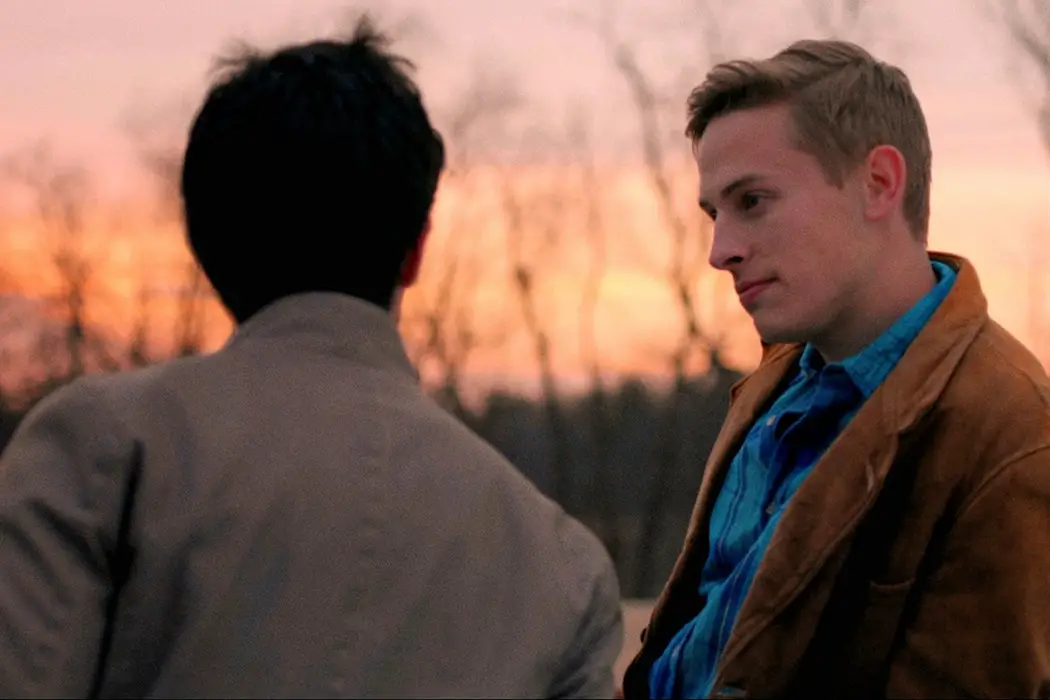AKRON: Plunky Guitar Strings Make Not Midwestern Living

An Instructor of Communication Studies at Ball State University, Spencer…
Growing up as a gay teenager in the Midwest has historically been depicted as precarious – between stereotypical unaccepting parents, bullies, and backwards thinking, LGBTQ+ teens often appear to be at the apex of violence and despair. While grounded in filmmakers’ lived reality, a more nuanced exploration of Midwestern living was not only essential, but a refreshing look at those who do not identify with others’ realities. In other words, what stories are out there when being gay is just a simple fact of life? Which of these stories are waiting to be told?
Akron attempts to bridge that divide. Telling the story of two college freshmen at the University of Akron in Ohio, Benny (Matthew Frias) and Christopher (Edmund Donovan), first time directors Sasha King and Brian O’Donnell seem far more interested in navigating not just what it means to be a young gay man living in Ohio, but the consequences of our actions, who we love, and why we choose to love in the first place. Through the storytelling here, it is abundantly clear that there is no such thing as a straightforward story. There are complexities, challenges, and struggles that make us come to terms with our connection to everything and everyone.
Grief Personified
When Akron opens, we bear witness to a tragic event occurring. With intentionally little exposition, we are then transported several years later – where we watch as Benny and Christopher flirt after a game of touch football. Numbers are exchanged, both Benny and Christopher tell their families about how excited they are, and the plot really begins. What is lurking beneath the surface, however, is much more than a tale of acceptance. The incredibly vague opening sequence returns in the present-day, leaving Benny, Christopher, and both of their families to pick up the pieces of grief, and figure out where to go from there.

To reveal what this “tragic event” is would defeat the very uniqueness that sets Akron apart from so many queer texts before its time. Needless to say, it serves as a catalyst for so many of the goings-on in the film, that to merely define it would leave little poetic justice for those wanting to watch it. But believe me when I say that it is through this tragedy that the film explores the complex emotions that come with any relationship, gay or straight. What it means to forgive, even for something minuscule, is questioned here – daring us to define what it is that makes us carry on. It is in this way that Akron succeeds: its ability to get at human experiences without coming across as cloying. Still, there is more than meets the eye.
But Why the Guitar?
Full disclosure: I grew up in the Midwest. For a time, I even lived close to Akron, Ohio. King and O’Donnell using this nondescript setting may have been a matter of convenience perhaps, but serves as an effective backdrop for a story that is anything but simple. Therein lies the film’s biggest flaw. In its short run time, Akron manages to avoid the tropes of many LGBTQ+ centered narratives. Here, we see characters who are completely accepted by their families, that do not have to struggle with their identities. But there is so much beneath the surface that is slowly revealed. This leads me to my biggest question: for a film with so much complexity, why is the entire score the strumming of a guitar?

This is a tiny nitpick, I know. However, this is one instance where the film feeds into the stereotype of Midwestern living – with its folksy, country score by Bill Snodgrass, I couldn’t help but wonder if the story could have been better served with a re-imagining of music. What else is there about the Midwest that could be explored here? The music indicates simplicity and the mundane, but the story itself is anything but simple.
All in all, Akron attempts to get at the heart of tragedy and all of the nuances that come with that. I deeply admire the directors laying all of these raw emotions out in a way that seems both honest and unique. Still, this is work from first-time directors. As such, some of the technical aspects leave much to be desired. For future projects, I anticipate crisper sound and more focused editing, but I can only fault those qualities to a certain point. What we have here is a story worth telling – regardless of one’s sexuality and identity, defining family is what keeps us going.
With that, I turn it to you! How does Akron’s unique narrative framing defy standard LGBTQ+ stories?
Akron has hit multiple film festivals and is also available to rent on iTunes.
Does content like this matter to you?
Become a Member and support film journalism. Unlock access to all of Film Inquiry`s great articles. Join a community of like-minded readers who are passionate about cinema - get access to our private members Network, give back to independent filmmakers, and more.
An Instructor of Communication Studies at Ball State University, Spencer enjoys the simple things in life: his cat (Laura Dern), Laura Dern (the actress), and snagging any chance he can get to watch movies. In his spare time, he champions Kristen Stewart and writes think-pieces about why Taylor Swift is a pop music mastermind.













